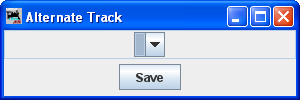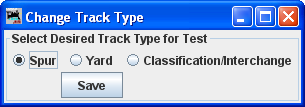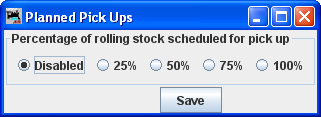Using JMRI® to Operate Trains
Add Spurs
A spur is used to service an industry. To add a spur, press . Spurs are very similar to Yards . You can if you with schedule the order that cars will be delivered to a spur, or demand cars with certain loads using Schedules.
When a car is placed at a spur the car's load status is modified. The program provides two load names for all cars. The default Empty or E and the default load or L. If a car has one of these loads when it arrives at a spur, the load will change to the other, i.e. E becomes L and L becomes E.
To add a location as a spur, in the Add Location window, type the Name of the spur location, note most of the window is greyed out until the location is added. The location name must be unique; the program will not allow two locations with identical names. However, if you want more than one location to have the same name for your manifests and switch lists, add a hyphen and a number to the locations name. For example, "Boston-1" and "Boston-2" will print as "Boston". The program will remove the hyphen and number when printing manifests and switch lists.
Now select Operations at this location Spurs, then press the at the bottom of the window.
A siding can be an industry or any place where a car is loaded or unloaded. For a train to service a location, there must be at least one track for that location.
This opens the Add Location window with all the options enabled.
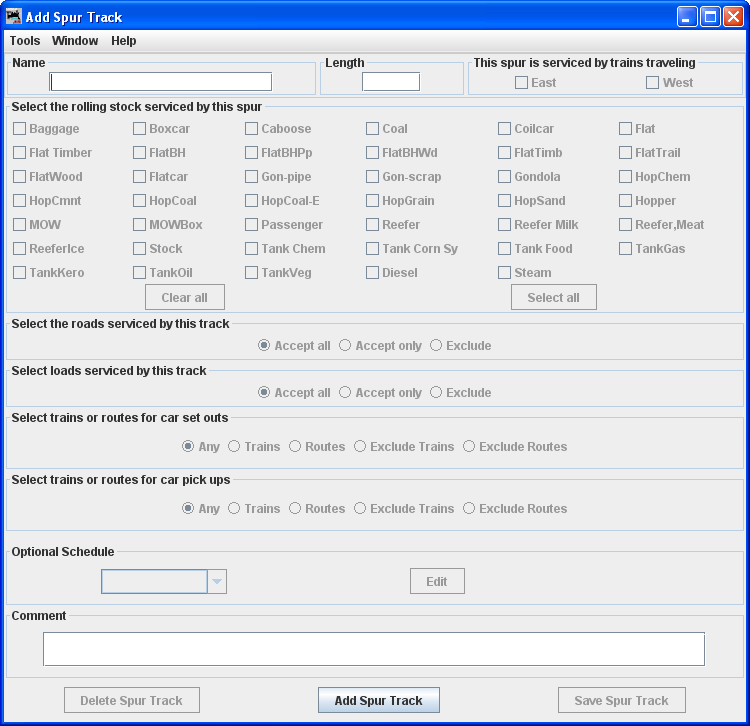
Add Spur Menu

Tools
Track Pools
Spurs may be combined and the their lengths combined.
Alernate Track
Change Track Type
Planned Pick Ups
You may select This location is serviced by trains traveling, select at least or any number of the directions depending on access to your siding. We have selected East and West
You can decide which train direction the location can service. For example, if only south bound trains can access the location select "South" and deselect the other directions. This can be useful if you want to support only trailing point switching for a given location. If a location can support multiple directions then select the ones that are appropriate.
Local Switcher: If you want only a local switcher to service a siding, deselect all of the direction boxes for that siding. The program will only allow a train that has one location in its route (local switcher) to service the siding. This would be useful if you wanted your trains to pick up and drop cars to a yard, and then have a local switcher move them to the town's sidings.
Next Select the rolling stock serviced by this location, note the and may be used to select. We have used the Clear All button and then selected Boxcar and Gondola for this location.
You can control the rolling stock a location can service. Push to deselect all types, or to select all types, then select or deselect the rolling stock you wish the location to accept.
Since the Operations at this location is a Spurs the is now enabled near the bottom of the window.
We also have the option to or
Press then the Add Spur Track window is displayed, so that you can detail the spur
 |
In Name type the specific siding track to be serviced at this location. Length of the siding track in scale feet. You may enter the measurement in actual inches as and the program will convert to the scale feet that you select during setup. Press the siding track is added and the greyed out features are activated. |
Add Spur Track window now displays with all options active to let you detail the spur.
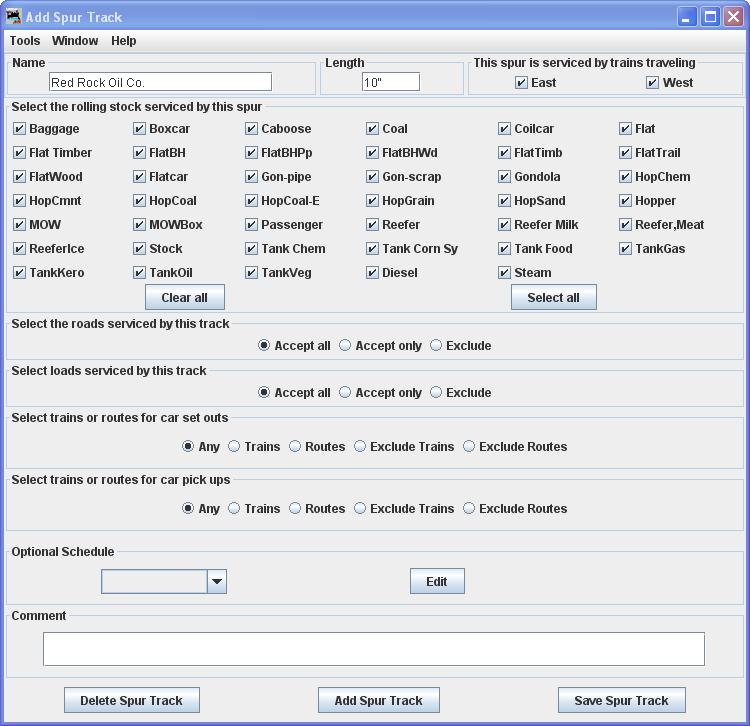
Select the rolling stock serviced by this spur
Only those items selected in the previous location window will be displayed. The program uses those that are chedked. unchecks all rolling stock. Now you may select any you require or press the to check all the rolling stock.
We are setting up a spur for an Oil Co. so we will clear all the select Tank for oil, kerosene and gas.
Select the roads serviced by this track
Accept all
Default accepts rolling stock from any railroad.Accept only
Allows you to list the railroads whose rolling stock you will accept.
Select Road you want to add from drop-down List the press repeat for each Road you would like to service this Spur. To remove Road form the Spure select from the drop-down list then press
Exclude
Similar to Accept only but creates a list of Roads that you do no want to service this location.
Select loads serviced by this track
Accept all
Default accepts any loadAccept only
Allows you to list the loads that this location will accept.
Select type of load from first drop-down list (Based on the type of rolling stock accepted). From second drop-down list select either Empty or Load, the press to list of acceptable loads. Repeat as necessary. Select a load then press to remove that load. You may remove all loads by pressing the
Exclude
Similar to Accept only but creates a list of aceptable loads that can be serviced by this location.
Select trains or routes for car set outs
any
Default cars may be set out by any Train or Route
Trains
Select Train form the drop-down List then press to add train that may set out cars at this location. To remove Train from list pressRoutes
Similar to Trains except you select a Route to add or remove to determine routes that may set out cars at this location.
Exclude Trains
Exclude Routes
Select trains or routes for car pick ups
This option is almost identical to car set outs except now car pick up options are selected.
Optional Schedule
Optionally, a schedule may be selected from the drop-down list. Press to open Add Schedule for Spur Tank Facility. Schedule
Comment
You may now press to add to the location or press if you do not want to store the track.
If you want to add another track to this siding location, then enter new data and Press to add the track.
Close the window when done with this location.
The Add Location window shows one siding track at the Tank Facility in Red Rock Oil.
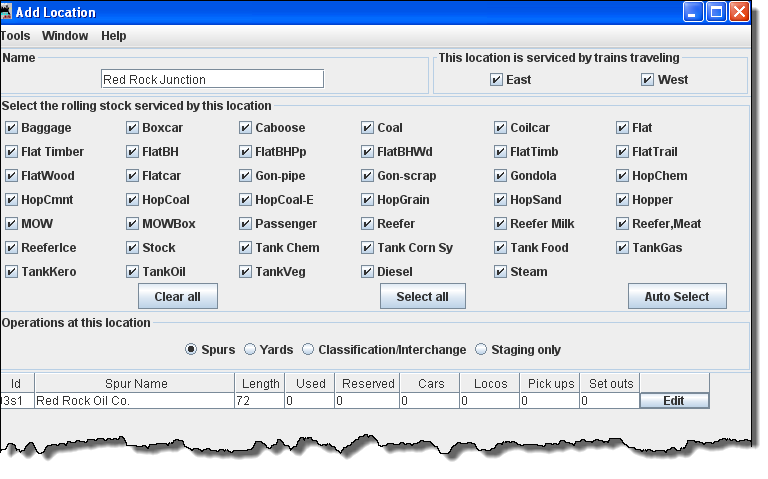
If you want to change information for any track entry, press and the Edit Spur Track window will open.
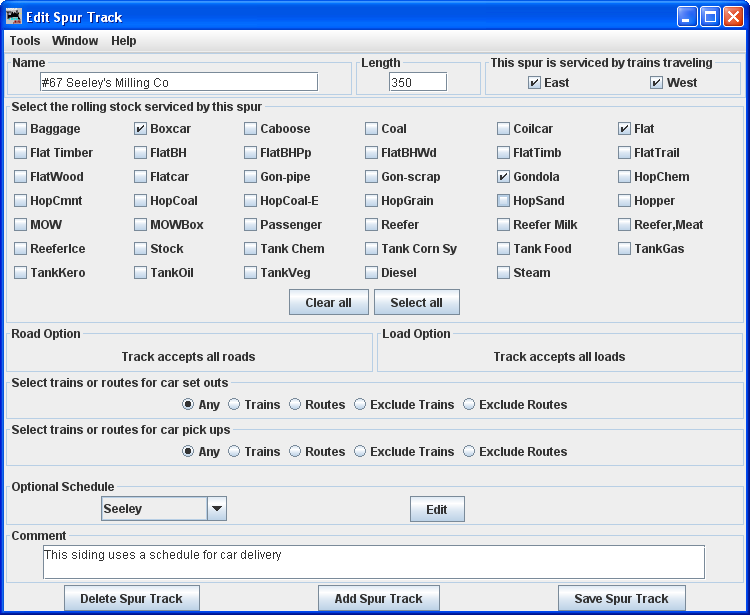
Note that it is identical to the Add Siding Track except for the title. Change any of the entries that you want to edit and then press the to save the changes. You may also from your data base.
Note we changed the length of the spur to 200 scale feet.
When done with editing close the window.
The Locations window shows all the locations in your database.
You may Edit any one of them, which opens the Edit Location window, which is the same as the Add Location window except it contains the info for the location you are editing.
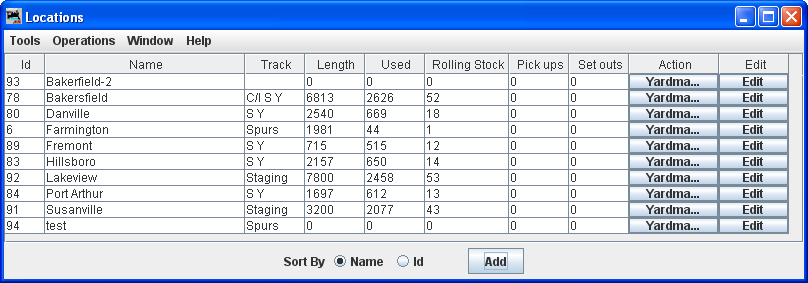
You may add as many locations and track as you need to complete the description of your layout.
